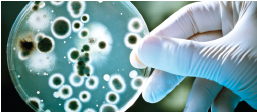Propolis, a resinous compound produced by Apis mellifera L. bees, possesses a variety of biological activities and is applied in the therapy of various infectious diseases. The current study was conducted to evaluate the in vitro antifungal activity of propolis ethanol extract (PE) and propolis microparticles (PMs) obtained from a sample of Brazilian propolis against clinical yeast isolates in vulvovaginal candidiasis (VVC). PE was used to prepare the microparticles. Yeast isolates (n = 89), obtained from vaginal exudates of patients with VVC, were exposed to the PE and the PMs, as well as to the main antifungal drugs used in the treatment of VVC (Fluconazole, Voriconazole, Itraconazole, Ketoconazole, Miconazole and Amphotericin B). All yeasts were inhibited by PE and PMs, with small variation, independent of the species of yeast. Some Candida albicans isolates showed resistance or dose-dependent susceptibility for the azolic drugs and Amphotericin B. Non-Candida albicans isolates showed more resistance and dose-dependent susceptibility for the azolic drugs than Candida albicans. However, all of them were sensitive or dose-dependent susceptible for Amphotericin B. The authors concluded that PMs may have potential application in the prevention or therapy of VVC. Evid Based Complement Alternat Med. 2011;2011:201953. PMID: 21607012.
Home Research News Brazilian propolis microparticles have antifungal activity against yeasts isolated from vulvovaginal candidiasis







